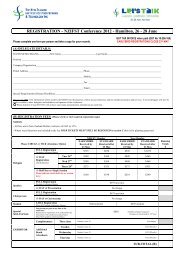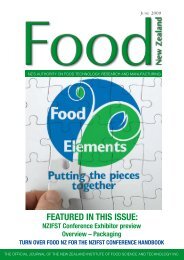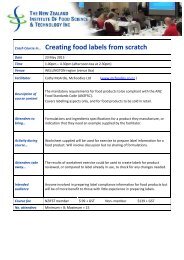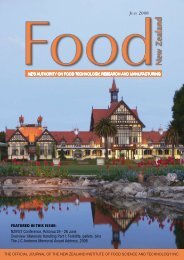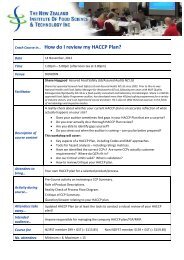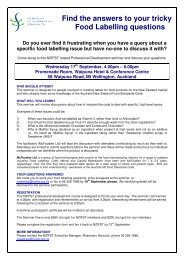FEATURED IN THIS ISSUE: - NZIFST - The New Zealand Institute of ...
FEATURED IN THIS ISSUE: - NZIFST - The New Zealand Institute of ...
FEATURED IN THIS ISSUE: - NZIFST - The New Zealand Institute of ...
Create successful ePaper yourself
Turn your PDF publications into a flip-book with our unique Google optimized e-Paper software.
Red meat sector strategy stocktakeMIA NEWSWork to build on the recommendations <strong>of</strong> the Red Meat Sector Strategy (RMSS) is underway, as outlined in the recent release <strong>of</strong> the firstquarterly report <strong>of</strong> the Strategy Coordination Group (SCG). Tim Ritchie, Meat Industry Association chief executive since 2007, is a member <strong>of</strong> thegroup and talks to Food NZ about progress to date.<strong>The</strong> SCG was formed to promote, advise, monitor and report on the implementation<strong>of</strong> the RMSS – effectively to help ensure that the RMSS didnot just become another document sitting on shelves, Tim Ritchie says.<strong>The</strong> SCG’s September quarterly report showed that meat processorshave already initiated, through the MIA, a number <strong>of</strong> collaborativeprojects aimed at achieving the required ‘informed, aligned behaviourchange’ identified in the RMSS.<strong>The</strong> MIA initiatives discussed in the report cover three areas: meat scienceand processing collaboration; market research collaboration; andcompliance costs.Meat Research Fund establishedIn the area <strong>of</strong> meat science and processing collaboration, MIA and itsmembers have established the Meat Research Fund (MRF), a model forjointly managing collectively funded meat science projects that enablesgroups <strong>of</strong> like-minded companies to propose, design and commissionresearch on specific meat science problems or opportunities. This replacesthe former Meat Industry Research <strong>Institute</strong> (MIR<strong>IN</strong>Z) Inc.Four MRF projects have already been established and commenced byresearch providers, with funding support from the Ministry <strong>of</strong> Scienceand Innovation. This first tranche <strong>of</strong> projects is concerned with improvingmeat quality, including tenderness, shelf life and meat colour.Ritchie explains that the MRF model builds upon the well-establishedOvine Automation Consortium, which is looking into robotic processing,and Ovis Management Ltd, tasked with minimising the incidence<strong>of</strong> sheep measles in NZ.which identified areas where the SCG considers there are immediateopportunities to promote and facilitate further consideration <strong>of</strong> RMSSrecommendations.For red meat processors, items <strong>of</strong> interest on the SCG’s action list incoming months include the development <strong>of</strong> a number <strong>of</strong> discussionpapers for consideration by sector participants. According to Ritchie,these will explore issues such as alternative marketing approaches,historical price benchmarking, transparent pricing and leveraging thesector’s data and analytical capability;“<strong>The</strong> SCG will also be in communication with senior trade and agricultural<strong>of</strong>ficials to develop a proposal for a new market access engagementmechanism and will engage with stock and station agentsto explore the possibility <strong>of</strong> the development <strong>of</strong> a voluntary code <strong>of</strong>practice for stock agents.”<strong>The</strong> SCG’s next quarterly report will be issued at the end <strong>of</strong> December.<strong>The</strong> full September quarterly report is available on the MIA websitewww.mia.co.nz.SCG membersOther SCG members are: Katherine Rich, chief executive <strong>of</strong> the <strong>New</strong><strong>Zealand</strong> Food and Grocery Council and former National MP; GraemeMilne, a pr<strong>of</strong>essional director in the primary sector; Paul Stocks, deputydirector general – policy from the Ministry <strong>of</strong> Agriculture and Forestry;Bill Falconer, MIA chair; Mike Petersen, Beef + Lamb NZ chair; and ScottChampion, B+LNZ chief executive. <strong>The</strong> group is co-chaired by Bill Falconerand Mike Petersen.Collaborating on market research<strong>The</strong> second area <strong>of</strong> work – market research collaboration – involvesthe MIA Renderers Group developing, with the assistance <strong>of</strong> <strong>New</strong> <strong>Zealand</strong>Trade and Enterprise funding, a collaborative market researchproject for rendered products in emerging markets.“<strong>New</strong> <strong>Zealand</strong> exports rendered products worth around $300 millionannually, but currently relies heavily on a small number <strong>of</strong> marketsand applications, so the Renderers Group intends to investigate theopportunities for marketing rendered products into new applicationsin emerging markets,” he comments.Leveraging maximum value from costs <strong>of</strong> compliance<strong>The</strong> third initiative relates to compliance costs. MIA and its membershave recently established with MAF a new strategic liaison group, theStrategic Directions Group (SDG), which aims to leverage maximumvalue from <strong>New</strong> <strong>Zealand</strong>’s regulatory regime and by minimising meatprocessing costs.Ritchie says the SDG will provide a governance forum for the industryto communicate its objectives and concerns to MAF, “ensuring that theroughly $80 million that the industry pays each year in direct governmentcharges delivers maximum value.”Other work to comeAs well as discussing these initiatives and other work underwaythrough B+LNZ, the report provides an overview <strong>of</strong> the actions thatthe SCG is undertaking in order to facilitate or promote implementation<strong>of</strong> the RMSS recommendations.This work is based on the outcome <strong>of</strong> the SCG’s stocktake exercise,Training supports andcareer OpportunitiesNZITO specialises in applied learningand development services in meat,dairy, and food processing. Ourspeciality in process operations,labs, boiler operations, transportand supply chain, and food safetytraining.NZITO delivers formal qualifications with subsidies. We alsoprovide lean manufacturing programs to companies to help boostproductivity, reduce waste, lower inventory, improve quality andstreamline communications within the workforce.NZITO supports career developments like gateway options toschools, plus apprenticeships for 16 to 21 year olds. We alsoworks with polytechnics and universities to deliver diploma anddegree options for advanced skillsneeds.People interested in should look atour website www.nzito.co.nz or callus for information.NZITO Box 488 Hamilton NZDecember 2011/January 2012 39



